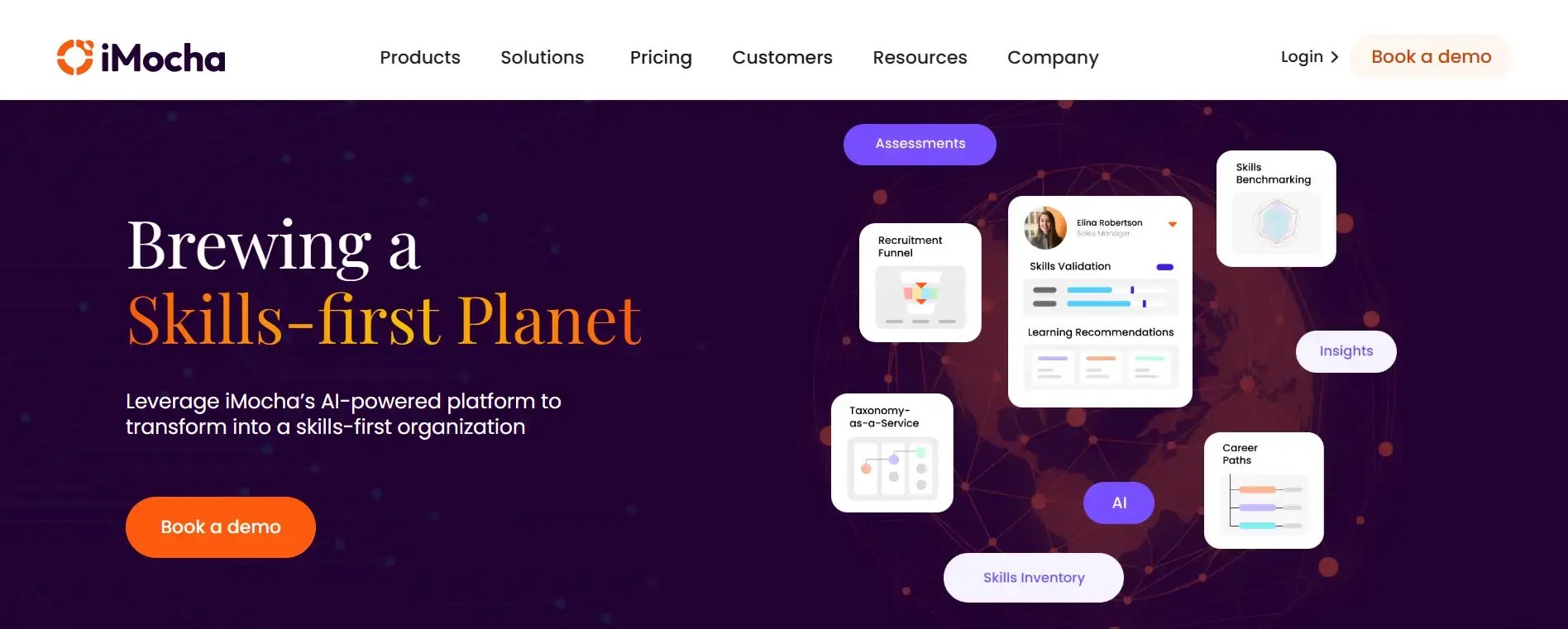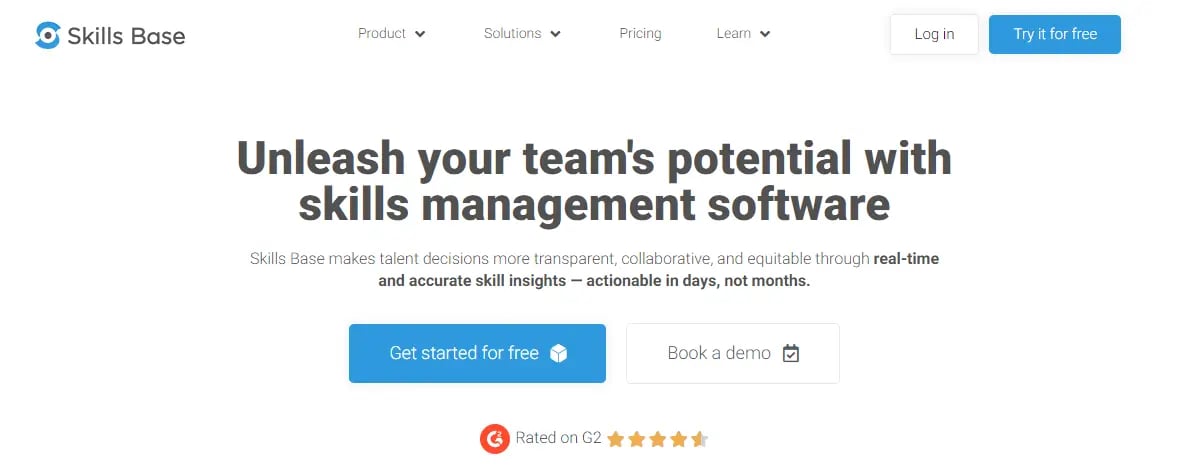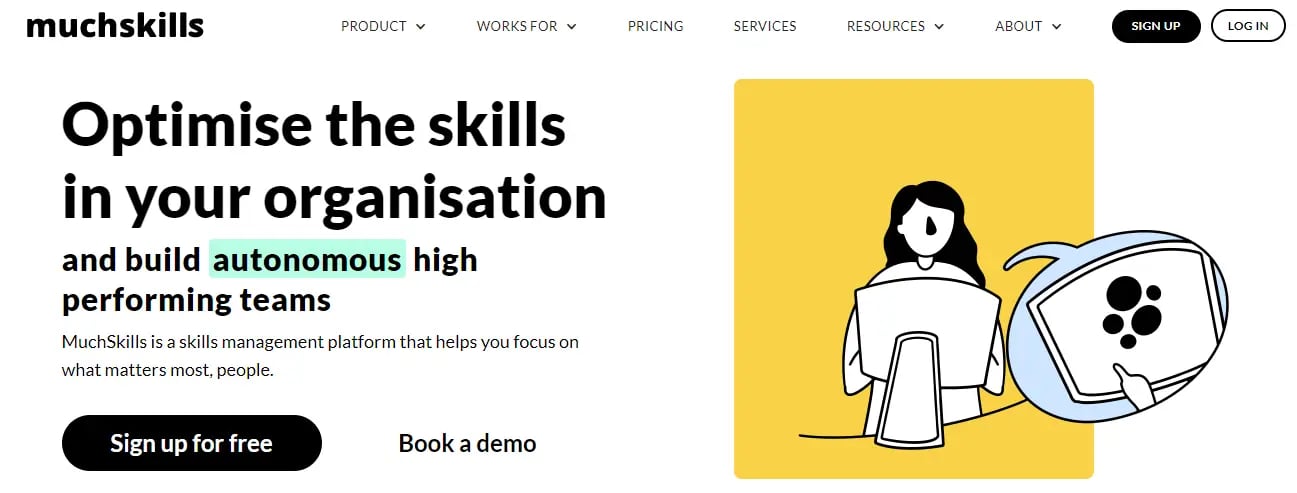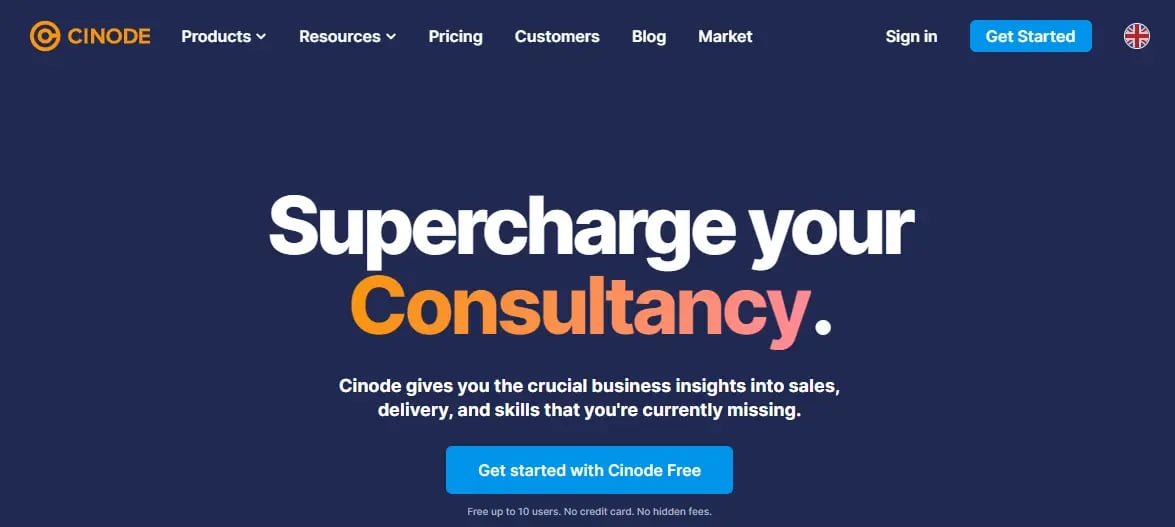Skills analytics is one of the essential aspects of running a profitable company in the modern era. Since it works with vast amounts of data, skills analytics offers an edge to businesses facing stringent competition.
Recent research shows that 39% of core skills are expected to change by 2030, emphasizing the urgency for organizations to prioritize continuous learning and upskilling. This evolution in required competencies makes skills analytics not just beneficial, but essential for staying competitive and future-ready.
It assists in making accurate workforce decisions. Whether identifying skill gaps or aligning workforce skills to accomplish short- and long-term goals, various skill analytics tools can be helpful. In this post, let's explore some of the best skills analytics tools.
What is a Skills Analytics Tool?
It is used for evaluating, analyzing, and managing the workforce's skills within a company. Being a software platform, it collects and processes data, such as employees' skills, performances, and experiences, and provides insights to help further in the skills gap identification, talent management optimization, improved workforce planning, employee growth, and alignment of workforce capabilities with business objectives.
Importance of a Skills Analytics Tool
With the ever-growing competition in the business environment today, there is an urgent need for Skills Analytics tools that allow organizations to:
- Identify skill gaps
- Optimize talent management
- Realign the workforce’s capability to meet strategic goals
These tools have data-driven insights to support better decision-making, enhance workforce agility, and drive employee development.
This enables businesses to respond swiftly to sudden changes in the marketplace and encourages continuous learning and innovation.
|
Table of contents |
Top 8 Skills Analytics Tools to Consider in 2026
1. iMocha
 iMocha is an AI-powered skills intelligence platform that offers comprehensive services to manage and develop workforce skills within organizations.
iMocha is an AI-powered skills intelligence platform that offers comprehensive services to manage and develop workforce skills within organizations.
This AI-driven platform provides businesses with advanced tools and solutions to enhance accuracy, speed, and adaptability in response to evolving market conditions.
Some of its essential features include:
- AI-Powered Skills Analytics: Leverages real-time data and AI to deliver actionable insights into workforce capabilities, skill gaps, and future readiness, enabling smarter talent decisions and strategic workforce planning.
- AI-driven Skills Intelligence: The platform offers real-time insights powered by AI analytics, helping organizations stay ahead of emerging trends.
- Upskilling & Reskilling: iMocha provides best-in-class skill gap identification and tailored learning recommendations. It maps the most relevant upskilling and reskilling programs that are aligned with the needs of organizations to drive growth and capability.
- Skill Assessment: With the advanced skill assessments provided by iMocha, organizations can quickly evaluate their strengths and areas for improvement.
- Skill Benchmarking: iMocha enables businesses to take charge by identifying best-fit talent for specific initiatives, teams, or projects.
G2 Rating: 4.4/5 (261 reviews)
|
Finding it difficult to tap into your workforce's skills metrics? Book a demo with iMocha to find a streamlined way. |
2. SkillTies
 An all-in-one skills analytics system, SkillTies helps organizations understand their workforce capabilities, identifying skill gaps, and optimizes talent management. Equipped with real-time data and insights, businesses stand out to make informed decisions for enhanced productivity and fuel continuous growth. Its key features include:
An all-in-one skills analytics system, SkillTies helps organizations understand their workforce capabilities, identifying skill gaps, and optimizes talent management. Equipped with real-time data and insights, businesses stand out to make informed decisions for enhanced productivity and fuel continuous growth. Its key features include:
- Skill Gap Analysis: It discovers the gap between current skills and business needs to target upskilling efforts.
- Real-time Reporting: SkillTies gives day-to-day insight into workforce skills, allowing timely and valid decision-making.
- Customizable Dashboards: The platform provides customized dashboards based on organizational objectives for tracking and visualizing skill data.
G2 Rating: NA
3. Skills Base
 Skills Base is a dynamic platform that allows organizations to manage and optimize their workforce skills. It offers tools to measure, track, and analyze employees' competencies, enabling businesses to make informed decisions about talent development and resource allocation. A few of its key features are:
Skills Base is a dynamic platform that allows organizations to manage and optimize their workforce skills. It offers tools to measure, track, and analyze employees' competencies, enabling businesses to make informed decisions about talent development and resource allocation. A few of its key features are:
- Skills Assessments: Skills Base provides personalized employee competency assessments, enabling targeted training and development.
- Skills Tracking: It allows tracking employee skills and competencies in great detail to maintain alignment with organizational goals.
- Reporting and Analytics: Enterprise-class reporting capabilities slice and dice the skill data to gain valuable insights for strategic workforce planning.
G2 Rating: 4.6/5 (26 reviews)
| Dive into our blog featuring the top 10 skills gap analysis tools that enhance smarter analytics and help close workforce skill gaps. |
4. MuchSkills
 MuchSkills is an intuitive platform designed to visualize and manage a team's skills. It assists organizations in mapping, evaluating, and optimizing their workforce capabilities, promoting strategic collaboration, informed talent development, and better decision-making. Its key features are:
MuchSkills is an intuitive platform designed to visualize and manage a team's skills. It assists organizations in mapping, evaluating, and optimizing their workforce capabilities, promoting strategic collaboration, informed talent development, and better decision-making. Its key features are:
- Skill Visualization: Offers a visual representation of the team's skills, making it easier to discover gaps and identify strengths.
- Team Skill Mapping: MuchSkills allows the mapping of individual and team competencies to optimize project assignments and resource allocation.
- Customizable Profiles: With this platform, companies can create detailed, personalized profiles of their employees, highlighting both soft and hard skills for accurate role alignment.
G2 Rating: 4.5/5 (1 review)
|
Not sure if your company is equipped with right skills to accomplish goals? Check out iMocha's skills intelligence solution for help. |
5. Crunchr
 Crunchr equips organizations with a powerful skills analytics solution that helps assess and optimize the current workforce's skills. This platform simplifies data-driven decisions by providing in-depth insight into talent management, skill gaps, and other development requirements. Some of its key features are:
Crunchr equips organizations with a powerful skills analytics solution that helps assess and optimize the current workforce's skills. This platform simplifies data-driven decisions by providing in-depth insight into talent management, skill gaps, and other development requirements. Some of its key features are:
- Real-time Analytics: It offers companies up-to-the-minute data on skill levels to help with resource planning and agile decision-making.
- Skill Gap Identification: Crunchr helps identify skill gaps on an organization-wide level to provide accurate guidance when it comes to upscaling strategies.
- Customizable Reports: The platform provides customized, informed reports on key and needed competencies of the workforce that help organizations align talent strategies to business objectives.
G2 Rating: 4.9/5 (23 reviews)
6. Cinode
 Cinode is a powerful skills management and talent matching platform tailored for consulting firms and project-driven organizations. It helps businesses gain full visibility into their workforce capabilities, align the right talent to the right roles, and plan capacity with precision. With tools for skill mapping, gap analysis, and resource forecasting, Cinode empowers HR and team leads to make data-driven decisions for growth and agility.
Cinode is a powerful skills management and talent matching platform tailored for consulting firms and project-driven organizations. It helps businesses gain full visibility into their workforce capabilities, align the right talent to the right roles, and plan capacity with precision. With tools for skill mapping, gap analysis, and resource forecasting, Cinode empowers HR and team leads to make data-driven decisions for growth and agility.
Some of its essential features include:
- Skill Mapping & Visualization: Offers a detailed view of individual and team skills, allowing leaders to identify gaps and align competencies with business goals.
- Resource Planning & Allocation: Matches the right talent to the right projects through an integrated overview of availability, roles, and skills.
- Internal & External Talent Pool Management: Combines freelance and employee skill data for a flexible and agile workforce structure.
G2 Rating: 4.5/5 (133 reviews)
7. SkillsDB
 SkillsDB is a flexible and scalable skills management platform that enables organizations to track, assess, and grow employee capabilities effectively. Ideal for companies looking to optimize their training, succession, and talent development strategies, it serves as a central repository for skills data, training records, and performance insights. It supports both real-time skills tracking and long-term strategic planning.
SkillsDB is a flexible and scalable skills management platform that enables organizations to track, assess, and grow employee capabilities effectively. Ideal for companies looking to optimize their training, succession, and talent development strategies, it serves as a central repository for skills data, training records, and performance insights. It supports both real-time skills tracking and long-term strategic planning.
Some of its essential features include:
- Skills Inventory & Gap Analysis: Allows organizations to build comprehensive skill profiles and pinpoint gaps to guide upskilling and hiring efforts.
- Certification & Training Tracking: Helps HR manage employee development by tracking training sessions, certifications, and learning milestones.
- Career Pathing & Succession Planning: Aligns talent with future roles by mapping current competencies to organizational needs and growth paths.
G2 Rating: NA
| Discover the top 10 talent pool management software that integrate well with skills analytics for data informed hiring. |
8. Pluralsight Advanced Analytics
 Pluralsight’s Advanced Analytics is a high-performance solution built to give tech-driven teams insight into workforce learning and skill growth. Designed for engineering, IT, and digital roles, it provides a granular view of proficiency levels, engagement rates, and skill progression. With custom reporting and real-time dashboards, organizations can measure the ROI of L&D initiatives and close technical skill gaps faster.
Pluralsight’s Advanced Analytics is a high-performance solution built to give tech-driven teams insight into workforce learning and skill growth. Designed for engineering, IT, and digital roles, it provides a granular view of proficiency levels, engagement rates, and skill progression. With custom reporting and real-time dashboards, organizations can measure the ROI of L&D initiatives and close technical skill gaps faster.
Some of its essential features include:
- Role-Based Skill Proficiency Analytics: Tracks how teams perform across key technical domains, identifying learning priorities and readiness.
- Engagement Insights & Learning Trends: Delivers in-depth visibility into course participation, completion rates, and learner behavior.
- Custom Skill Groups & Report Exports: Allows businesses to group skills by role or department and export data for deeper performance analysis.
G2 Rating: 4.5/5 (1039 reviews)
Conclusion
While many tools offer valuable insights, iMocha truly stands apart as a comprehensive skills intelligence solution. iMocha redefines how organizations approach skills analytics by offering precise assessments, detailed benchmarking, and effective skills management.
This enables organizations to keep their workforce aligned with rapidly evolving business goals. With its strong skills taxonomy, targeted upskilling program recommendations, and skills inventory, iMocha empowers organizations to build an agile, future-ready workforce strategically aligned with market demands.
| Discover top 8 skills taxonomy software that improves skills analytics by providing clear classification of competencies across your organization. |
FAQs
What are the benefits of skills analytics tools?
Skill analytics tools help identify skill gaps, improve talent management, and develop better workforce capabilities aligned with business objectives.
How do skills analytics tools identify skills gaps?
Skill analytics tools analyze employee competencies against required skills through assessment and benchmarking to reveal areas that need development for upskilling and reskilling.
How do skills analytics tools help in workforce planning?
It provide insights into the current skill sets, forecast future needs, and align talent resources against strategic goals to optimize workforce use.

